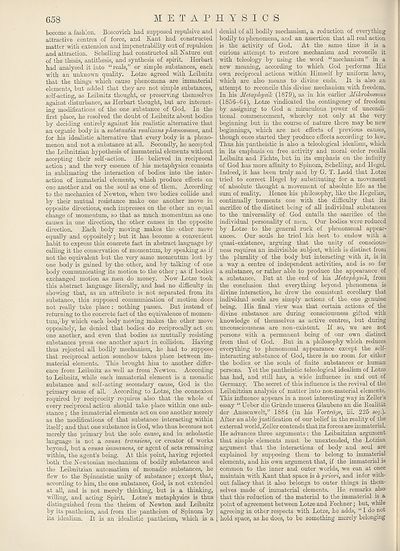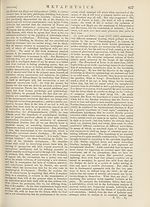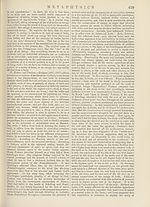New volumes of the Encyclopædia Britannica > Volume 30, K-MOR
(702) Page 658
Download files
Complete book:
Individual page:
Thumbnail gallery: Grid view | List view

H Y S I C S
658 M E T A P
become a fashion. Boscovich had supposed repulsive and
attractive centres of force, and Kant had constructed
matter with extension and impenetrability out of repulsion
and attraction. Schelling had constructed all Nature out
of the thesis, antithesis, and synthesis of spirit. Herbart
had analysed it into “reals,” or simple substances, each
with an unknown quality. Lotze agreed with Leibnitz
that the things which cause phenomena are immaterial
elements, but added that they are not simple substances,
self-acting, as Leibnitz thought, or preserving themselves
against disturbance, as Herbart thought, but are interact¬
ing modifications of the one substance of God. In the
first place, he resolved the doubt of Leibnitz about bodies
by deciding entirely against his realistic alternative that
an organic body is a substantia realizans phcenomena, and
for his idealistic alternative that every body is a pheno¬
menon and not a substance at all. Secondly, he accepted
the Leibnitzian hypothesis of immaterial elements without
accepting their self-action. He believed in reciprocal
action; and the very essence of his metaphysics consists
in sublimating the interaction of bodies into the inter¬
action of immaterial elements, which produce effects on
one another and on the soul as one of them. According
to the mechanics of Newton, when two bodies collide and
by their mutual resistance make one another move in
opposite directions, each impresses on the other an equal
change of momentum, so that as much momentum as one
causes in one direction, the other causes in the opposite
direction. Each body moving makes the other move
equally and oppositely; but it has become a couvenient
habit to express this concrete fact in abstract language by
calling it the conservation of momentum, by speaking as if
not the equivalent but the very same momentum lost by
one body is gained by the other, and by talking of one
body communicating its motion to the other; as if bodies
exchanged motion as men do money. Now Lotze took
this abstract language literally, and had no difficulty in
showing that, as an attribute is not separated from its
substance, this supposed communication of motion does
not really take place : nothing passes. But instead of
returning to the concrete fact of the equivalence of momen¬
tum, by which each body moving makes the other move
oppositely, he denied that bodies do reciprocally act on
one another, and even that bodies as mutually resisting
substances press one another apart in collision. Having
thus rejected all bodily mechanism, he had to suppose
that reciprocal action somehow takes place between im¬
material elements. This brought him to another differ¬
ence from Leibnitz as well as from Newton. According
to Leibnitz, while each immaterial element is a monadic
substance and self-acting secondary cause, God is the
primary cause of all. According to Lotze, the connexion
required by reciprocity requires also that the whole of
every reciprocal action should take place within one sub¬
stance ; the immaterial elements act on one another merely
as the modifications of that substance interacting within
itself; and that one substance is God, who thus becomes not
merely the primary but the sole cause, and in scholastic
language is not a causa transiens, or creator of works
beyond, but a causa immanent, or agent of acts remaining
within, the agent’s being. At this point, having rejected
both the Newtonian mechanism of bodily substances and
the Leibnitzian automatism of monadic substances, he
flew to the Spinozistic unity of substance; except that,
according to him, the one substance, God, is not extended
at all, and is not merely thinking, but is a thinking,
willing, and acting Spirit. Lotze’s metaphysics is thus
distinguished from the theism of Newton and Leibnitz
by its pantheism, and from the pantheism of Spinoza by
its idealism. It is an idealistic pantheism, which is a
denial of all bodily mechanism, a reduction of everything
bodily to phenomena, and an assertion that all real action
is the activity of God. At the same time it is a
curious attempt to restore mechanism and reconcile it
with teleology by using the word “mechanism” in a
new meaning, according to which God performs His
own reciprocal actions within Himself by uniform laws,
which are also means to divine ends. It is also an
attempt to reconcile this divine mechanism with freedom.
In his Metaphysik (1879), as in his earlier Mikrokosmus
(1856-64), Lotze vindicated the contingency of freedom
by assigning to God a miraculous power of uncondi¬
tional commencement, whereby not only at the very
beginning but in the course of nature there may be new
beginnings, which are not effects of previous causes,
though once started they produce effects according to law.
Thus his pantheistic is also a teleological idealism, which
in its emphasis on free activity and moral order recalls
Leibnitz and Fichte, but in its emphasis on the infinity
of God has more affinity to Spinoza, Schelling, and Hegel.
Indeed, it has been truly said by G. T. Ladd that Lotze
tried to correct Hegel by substituting for a movement
of absolute thought a movement of absolute life as the
sum of reality. Hence his philosophy, like the Hegelian,
continually torments one with the difficulty that its
sacrifice of the distinct being of all individual substances
to the universality of God entails the sacrifice of the
individual personality of men. Our bodies were reduced
by Lotze to the general ruck of phenomenal appear¬
ances. Our souls he tried his best to endow with a
quasi-existence, arguing that the unity of conscious¬
ness requires an indivisible subject, which is distinct from
the plurality of the body but interacting with it, is in
a way a centre of independent activities, and is so far
a substance, or rather able to produce the appearance of
a substance. But at the end of his Metaphysik, from
the conclusion that everything beyond phenomena is
divine interaction, he drew the consistent corollary that
individual souls are simply actions of the one genuine
being. His final view was that certain actions of the
divine substance are during consciousness gifted with
knowledge of themselves as active centres, but during
unconsciousness are non-existent. If so, we are not
persons with a permanent being of our own distinct
from that of God. But in a philosophy which reduces
everything to phenomenal appearance except the self¬
interacting substance of God, there is no room for either
the bodies or the souls of finite substances or human
persons. Yet the pantheistic teleological idealism of Lotze
has had, and still has, a wide influence in and out of
Germany. The secret of this influence is the revival of the
Leibnitzian analysis of matter into non-material elements.
This influence appears in a most interesting way in Zeller’s
essay “ Ueber die Griinde unseres Glaubens an die Kealitiit
der Aussenwelt,” 1884 (in his Vortrdge, iii. 225 seq.).
After an able justification of our belief in the reality of the
external world, Zeller contends that its forces are immaterial.
He advances three arguments : the Leibnitzian argument
that simple elements must be unextended, the Lotzian
argument that the interactions of body and soul are
explained by supposing them to belong to immaterial
elements, and his own argument that, if the immaterial is
common to the inner and outer worlds, we can at once
maintain with Kant that space is d priori, and infer with¬
out fallacy that it also belongs to outer things in them¬
selves made of immaterial elements. He remarks also
that this reduction of the material to the immaterial is. a
point of agreement between Lotze and Fechner ; but, while
agreeing in other respects with Lotze, he adds, “ I do not
hold space, as he does, to be something merely belonging
658 M E T A P
become a fashion. Boscovich had supposed repulsive and
attractive centres of force, and Kant had constructed
matter with extension and impenetrability out of repulsion
and attraction. Schelling had constructed all Nature out
of the thesis, antithesis, and synthesis of spirit. Herbart
had analysed it into “reals,” or simple substances, each
with an unknown quality. Lotze agreed with Leibnitz
that the things which cause phenomena are immaterial
elements, but added that they are not simple substances,
self-acting, as Leibnitz thought, or preserving themselves
against disturbance, as Herbart thought, but are interact¬
ing modifications of the one substance of God. In the
first place, he resolved the doubt of Leibnitz about bodies
by deciding entirely against his realistic alternative that
an organic body is a substantia realizans phcenomena, and
for his idealistic alternative that every body is a pheno¬
menon and not a substance at all. Secondly, he accepted
the Leibnitzian hypothesis of immaterial elements without
accepting their self-action. He believed in reciprocal
action; and the very essence of his metaphysics consists
in sublimating the interaction of bodies into the inter¬
action of immaterial elements, which produce effects on
one another and on the soul as one of them. According
to the mechanics of Newton, when two bodies collide and
by their mutual resistance make one another move in
opposite directions, each impresses on the other an equal
change of momentum, so that as much momentum as one
causes in one direction, the other causes in the opposite
direction. Each body moving makes the other move
equally and oppositely; but it has become a couvenient
habit to express this concrete fact in abstract language by
calling it the conservation of momentum, by speaking as if
not the equivalent but the very same momentum lost by
one body is gained by the other, and by talking of one
body communicating its motion to the other; as if bodies
exchanged motion as men do money. Now Lotze took
this abstract language literally, and had no difficulty in
showing that, as an attribute is not separated from its
substance, this supposed communication of motion does
not really take place : nothing passes. But instead of
returning to the concrete fact of the equivalence of momen¬
tum, by which each body moving makes the other move
oppositely, he denied that bodies do reciprocally act on
one another, and even that bodies as mutually resisting
substances press one another apart in collision. Having
thus rejected all bodily mechanism, he had to suppose
that reciprocal action somehow takes place between im¬
material elements. This brought him to another differ¬
ence from Leibnitz as well as from Newton. According
to Leibnitz, while each immaterial element is a monadic
substance and self-acting secondary cause, God is the
primary cause of all. According to Lotze, the connexion
required by reciprocity requires also that the whole of
every reciprocal action should take place within one sub¬
stance ; the immaterial elements act on one another merely
as the modifications of that substance interacting within
itself; and that one substance is God, who thus becomes not
merely the primary but the sole cause, and in scholastic
language is not a causa transiens, or creator of works
beyond, but a causa immanent, or agent of acts remaining
within, the agent’s being. At this point, having rejected
both the Newtonian mechanism of bodily substances and
the Leibnitzian automatism of monadic substances, he
flew to the Spinozistic unity of substance; except that,
according to him, the one substance, God, is not extended
at all, and is not merely thinking, but is a thinking,
willing, and acting Spirit. Lotze’s metaphysics is thus
distinguished from the theism of Newton and Leibnitz
by its pantheism, and from the pantheism of Spinoza by
its idealism. It is an idealistic pantheism, which is a
denial of all bodily mechanism, a reduction of everything
bodily to phenomena, and an assertion that all real action
is the activity of God. At the same time it is a
curious attempt to restore mechanism and reconcile it
with teleology by using the word “mechanism” in a
new meaning, according to which God performs His
own reciprocal actions within Himself by uniform laws,
which are also means to divine ends. It is also an
attempt to reconcile this divine mechanism with freedom.
In his Metaphysik (1879), as in his earlier Mikrokosmus
(1856-64), Lotze vindicated the contingency of freedom
by assigning to God a miraculous power of uncondi¬
tional commencement, whereby not only at the very
beginning but in the course of nature there may be new
beginnings, which are not effects of previous causes,
though once started they produce effects according to law.
Thus his pantheistic is also a teleological idealism, which
in its emphasis on free activity and moral order recalls
Leibnitz and Fichte, but in its emphasis on the infinity
of God has more affinity to Spinoza, Schelling, and Hegel.
Indeed, it has been truly said by G. T. Ladd that Lotze
tried to correct Hegel by substituting for a movement
of absolute thought a movement of absolute life as the
sum of reality. Hence his philosophy, like the Hegelian,
continually torments one with the difficulty that its
sacrifice of the distinct being of all individual substances
to the universality of God entails the sacrifice of the
individual personality of men. Our bodies were reduced
by Lotze to the general ruck of phenomenal appear¬
ances. Our souls he tried his best to endow with a
quasi-existence, arguing that the unity of conscious¬
ness requires an indivisible subject, which is distinct from
the plurality of the body but interacting with it, is in
a way a centre of independent activities, and is so far
a substance, or rather able to produce the appearance of
a substance. But at the end of his Metaphysik, from
the conclusion that everything beyond phenomena is
divine interaction, he drew the consistent corollary that
individual souls are simply actions of the one genuine
being. His final view was that certain actions of the
divine substance are during consciousness gifted with
knowledge of themselves as active centres, but during
unconsciousness are non-existent. If so, we are not
persons with a permanent being of our own distinct
from that of God. But in a philosophy which reduces
everything to phenomenal appearance except the self¬
interacting substance of God, there is no room for either
the bodies or the souls of finite substances or human
persons. Yet the pantheistic teleological idealism of Lotze
has had, and still has, a wide influence in and out of
Germany. The secret of this influence is the revival of the
Leibnitzian analysis of matter into non-material elements.
This influence appears in a most interesting way in Zeller’s
essay “ Ueber die Griinde unseres Glaubens an die Kealitiit
der Aussenwelt,” 1884 (in his Vortrdge, iii. 225 seq.).
After an able justification of our belief in the reality of the
external world, Zeller contends that its forces are immaterial.
He advances three arguments : the Leibnitzian argument
that simple elements must be unextended, the Lotzian
argument that the interactions of body and soul are
explained by supposing them to belong to immaterial
elements, and his own argument that, if the immaterial is
common to the inner and outer worlds, we can at once
maintain with Kant that space is d priori, and infer with¬
out fallacy that it also belongs to outer things in them¬
selves made of immaterial elements. He remarks also
that this reduction of the material to the immaterial is. a
point of agreement between Lotze and Fechner ; but, while
agreeing in other respects with Lotze, he adds, “ I do not
hold space, as he does, to be something merely belonging
Set display mode to:
![]() Universal Viewer |
Universal Viewer | ![]() Mirador |
Large image | Transcription
Mirador |
Large image | Transcription
Images and transcriptions on this page, including medium image downloads, may be used under the Creative Commons Attribution 4.0 International Licence unless otherwise stated. ![]()
| Encyclopaedia Britannica > New volumes of the Encyclopædia Britannica > Volume 30, K-MOR > (702) Page 658 |
|---|
| Permanent URL | https://digital.nls.uk/193576627 |
|---|
| Attribution and copyright: |
|
|---|---|
| Shelfmark | EB.18 |
|---|---|
| Description | Ten editions of 'Encyclopaedia Britannica', issued from 1768-1903, in 231 volumes. Originally issued in 100 weekly parts (3 volumes) between 1768 and 1771 by publishers: Colin Macfarquhar and Andrew Bell (Edinburgh); editor: William Smellie: engraver: Andrew Bell. Expanded editions in the 19th century featured more volumes and contributions from leading experts in their fields. Managed and published in Edinburgh up to the 9th edition (25 volumes, from 1875-1889); the 10th edition (1902-1903) re-issued the 9th edition, with 11 supplementary volumes. |
|---|---|
| Additional NLS resources: |
|

